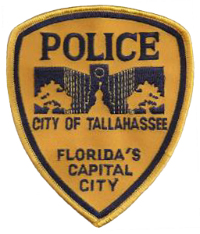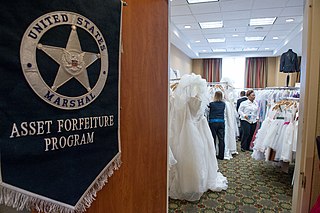
The Fourth Amendment to the United States Constitution is part of the Bill of Rights. It prohibits unreasonable searches and seizures and sets requirements for issuing warrants: warrants must be issued by a judge or magistrate, justified by probable cause, supported by oath or affirmation, and must particularly describe the place to be searched and the persons or things to be seized.
In United States criminal law, probable cause is the standard by which police authorities have reason to obtain a warrant for the arrest of a suspected criminal or the issuing of a search warrant. There is no universally accepted definition or formulation for probable cause. One traditional definition, which comes from the U.S. Supreme Court's 1964 decision Beck v. Ohio, is when "whether at [the moment of arrest] the facts and circumstances within [an officer's] knowledge and of which they had reasonably trustworthy information [are] sufficient to warrant a prudent [person] in believing that [a suspect] had committed or was committing an offense."

Search and seizure is a procedure used in many civil law and common law legal systems by which police or other authorities and their agents, who, suspecting that a crime has been committed, commence a search of a person's property and confiscate any relevant evidence found in connection to the crime.
A Terry stop in the United States allows the police to briefly detain a person based on reasonable suspicion of involvement in criminal activity. Reasonable suspicion is a lower standard than probable cause which is needed for arrest. When police stop and search a pedestrian, this is commonly known as a stop and frisk. When police stop an automobile, this is known as a traffic stop. If the police stop a motor vehicle on minor infringements in order to investigate other suspected criminal activity, this is known as a pretextual stop. Additional rules apply to stops that occur on a bus.
"Driving while black" (DWB) is a sardonic description of racial profiling of African-American motor vehicle drivers. It implies that a motorist may be stopped by a police officer largely because of racial bias rather than any apparent violation of traffic law. It is a word play of "driving while intoxicated."
In the United States, the exclusionary rule is a legal rule, based on constitutional law, that prevents evidence collected or analyzed in violation of the defendant's constitutional rights from being used in a court of law. This may be considered an example of a prophylactic rule formulated by the judiciary in order to protect a constitutional right. The exclusionary rule may also, in some circumstances at least, be considered to follow directly from the constitutional language, such as the Fifth Amendment's command that no person "shall be compelled in any criminal case to be a witness against himself" and that no person "shall be deprived of life, liberty or property without due process of law."
The blue wall of silence, also blue code and blue shield, are terms used to denote the informal code of silence among police officers in the United States not to report on a colleague's errors, misconducts, or crimes, especially as related to police brutality in the United States. If questioned about an incident of alleged misconduct involving another officer, while following the code, the officer being questioned would perjure themselves by feigning ignorance of another officer's wrongdoing.
Illinois v. Gates, 462 U.S. 213 (1983), is a Fourth Amendment case. Gates overruled Aguilar v. Texas and Spinelli v. United States, thereby replacing the Aguilar–Spinelli test for probable cause with the "totality of the circumstances" test.

The Tallahassee Police Department (TPD) is the municipal police for that provides public safety services for the city of Tallahassee, Florida, United States. Within the department, there are twelve primary divisions: The Chief of Police, Internal Affairs, Development Bureau, Investigations, Traffic Enforcement, Crime Analysis Unit, Public Information Office, Towing Administration, Property & Evidence, Operations Bureau, Technology, Records, and Special Operations.
In the United States, qualified immunity is a legal principle of federal constitutional law that grants government officials performing discretionary (optional) functions immunity from lawsuits for damages unless the plaintiff shows that the official violated "clearly established statutory or constitutional rights of which a reasonable person would have known". It is a form of sovereign immunity less strict than absolute immunity that is intended to protect officials who "make reasonable but mistaken judgments about open legal questions", extending to "all [officials] but the plainly incompetent or those who knowingly violate the law". Qualified immunity applies only to government officials in civil litigation, and does not protect the government itself from suits arising from officials' actions.
Florida v. Bostick, 501 U.S. 429 (1991), was a United States Supreme Court case that overturned a per se rule imposed by the Florida Supreme Court that held consensual searches of passengers on buses were always unreasonable. The Court ruled that the fact that the search takes place on a bus is one factor in determining whether a suspect feels free to decline the search and walk away from the officers.
In the United States, a no-knock warrant is a warrant issued by a judge that allows law enforcement to enter a property without immediate prior notification of the residents, such as by knocking or ringing a doorbell. In most cases, law enforcement will identify themselves just before they forcefully enter the property. It is issued under the belief that any evidence they hope to find may be destroyed between the time that police identify themselves and the time they secure the area, or in the event where there is a large perceived threat to officer safety during the execution of the warrant.

The Fifth Amendment to the United States Constitution creates several constitutional rights, limiting governmental powers focusing on criminal procedures. It was ratified, along with nine other articles, in 1791 as part of the Bill of Rights.

Barry Cooper is an American drug reform activist and filmmaker. Formerly a police officer in Texas, Cooper is best known for KopBusters, a series of online videos in which he attempts to document police misconduct, and Never Get Busted Again, a series of videos aimed at teaching drug users how to evade arrest by the police.
The law of search and seizure in Pennsylvania is controlled by both the United States Constitution and the broader protections of the Pennsylvania Constitution. This article is concerned only with the protections provided by the Pennsylvania Constitution.
United States v. Mendenhall, 446 U.S. 544 (1980), was a United States Supreme Court case that determined "seizure" occurs when an officer uses displays of authority to detain a person.

In the United States, civil forfeiture is a process in which law enforcement officers take assets from people who are suspected of involvement with crime or illegal activity without necessarily charging the owners with wrongdoing. While civil procedure, as opposed to criminal procedure, generally involves a dispute between two private citizens, civil forfeiture involves a dispute between law enforcement and property such as a pile of cash or a house or a boat, such that the thing is suspected of being involved in a crime. To get back the seized property, owners must prove it was not involved in criminal activity. Sometimes it can mean a threat to seize property as well as the act of seizure itself. Civil forfeiture is not considered to be an example of a criminal justice financial obligation.

The militarization of police is the use of military equipment and tactics by law enforcement officers. This includes the use of armored personnel carriers (APCs), assault rifles, submachine guns, flashbang grenades, sniper rifles, and SWAT teams. The militarization of law enforcement is also associated with intelligence agency–style information gathering aimed at the public and political activists and with a more aggressive style of law enforcement. Criminal justice professor Peter Kraska has defined militarization of police as "the process whereby civilian police increasingly draw from, and pattern themselves around, the tenets of militarism and the military model".
United States v. Drayton, 536 U.S. 194 (2002), was a case in which the United States Supreme Court clarified the applicability of Fourth Amendment protections to searches and seizures that occur on buses, as well as the function of consent during searches by law enforcement. During a scheduled stop in Tallahassee, Florida, police officers boarded a Greyhound bus as part of a drug interdiction effort and interviewed passengers. After talking to two of the passengers and asking if they could "check [their] person", officers discovered the two passengers had taped several packages of cocaine to their legs. At trial, the passengers argued that officers violated their Fourth Amendment rights against unreasonable searches and seizures because the police engaged in coercive behavior and never informed them that their participation in the drug interdiction efforts was voluntary.





